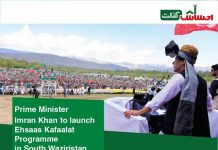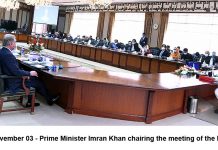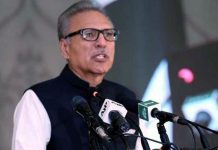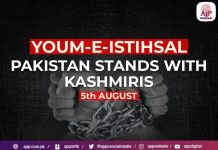SRINAGAR/ISLAMABAD: Indian security forces on Wednesday removed dozens of black and Pakistani flags in India-held Kashmir hoisted by residents observing a “black day” on the call of the Pakistani government to protest the killing of a top pro-independence commander.
Indian administration feared fresh trouble in the tense region after Prime Minister Nawaz Sharif called for observing a “black day” to express solidarity with “Kashmiris facing atrocities at the hands of Indian forces”.
In a statement, Nawaz said, “India should realise that when people decide to do something, the weapons cannot stop their way.”
Rubbishing Indian claim of Kashmir being its internal matter, Nawaz said: “Kashmir cannot be accepted as an internal matter of India as it has been declared a disputed territory by the United Nations.”
The largest street protests in recent years erupted after Indian troops on July 8 killed Burhan Wani, the popular 22-year-old commander of Hizbul Mujahideen.
Police and paramilitary soldiers in riot gear enforced a strict curfew for the 12th straight day on Wednesday as life remained paralysed and streets deserted in the region.
Responding to Nawaz’s appeal, rallies were organised across the country condemning human rights violations by Indian security forces in held Kashmir.
Nawaz said India had promised the world to hold a plebiscite in Kashmir, but such a commitment was yet to be honoured.
Earlier, India’s External Affairs Ministry responded to Pakistan’s call for a “black day” by saying Islamabad should stop “interfering in India’s internal affairs and destabilising the situation”.
During the recent protests, clashes between the Indian forces and Kashmiris have left at least 47 people, mostly teens and young men, dead. Hundreds of volunteers and people attending to the injured in the hospital gathered outside on the main road and offered prayers before his body was taken to his village for burial. They raised anti-India, pro-Pakistan and pro-freedom slogans.
Virtually no information was coming from most parts of Indian-held Kashmir, especially in the south where most of the killings have occurred, as cellular and internet services remained suspended. Newspapers were forced to stop printing and access to landline connections was limited, except in Srinagar.
The black day was also observed in Pakistan to express solidarity with the Kashmiris and protest rights violations by the Indian forces in Occupied Kashmir. The federal government had directed all its ministries and divisions as well as provincial governments to mark Wednesday as a black day.
Rallies and functions were arranged all over the country and Azad Kashmir to draw attention of the world community towards the burning issue of Kashmir. Officials of federal and provincial governments wore black armbands to denounce Indian atrocities in occupied Kashmir and express solidarity with the Kashmiris.
People prayed for the martyrs of Kashmir at special ceremonies. Pakistani missions abroad briefed the media as well as caucuses about the Kashmir issue.
In many big cities banners were displayed at prominent places inscribed with slogans in favour of the Kashmir freedom movement. These banners carried slogans such as “down with Indian occupation”, “stop atrocities against Kashmiris”, “grant right of self-determination to Kashmiris” and “international community should take notice of human rights violations in Indian-Occupied Kashmir”.
A large number of political, social, academic and non-government organisations marked the day to highlight the plight of Kashmiri people in Indian-Occupied Kashmir.
In a message, National Assembly Speaker Sardar Ayaz Sadiq urged the international community to play its role to stop Indian atrocities against innocent Kashmiris in the occupied valley. He asked the international community to play its due role to resolve the issue of Kashmir as per UN resolutions.
In the federal capital, a number of Hurriyat leaders attended a seminar titled “Indian oppression in Kashmir and its social impact” under the aegis of the National Council of Social Welfare. They condemned the human rights violations in Kashmir and demanded implementation of the UN resolutions on Kashmir.
President Mamnoon Hussain and entire staff of the Presidency also wore black armbands to mark the black day.









